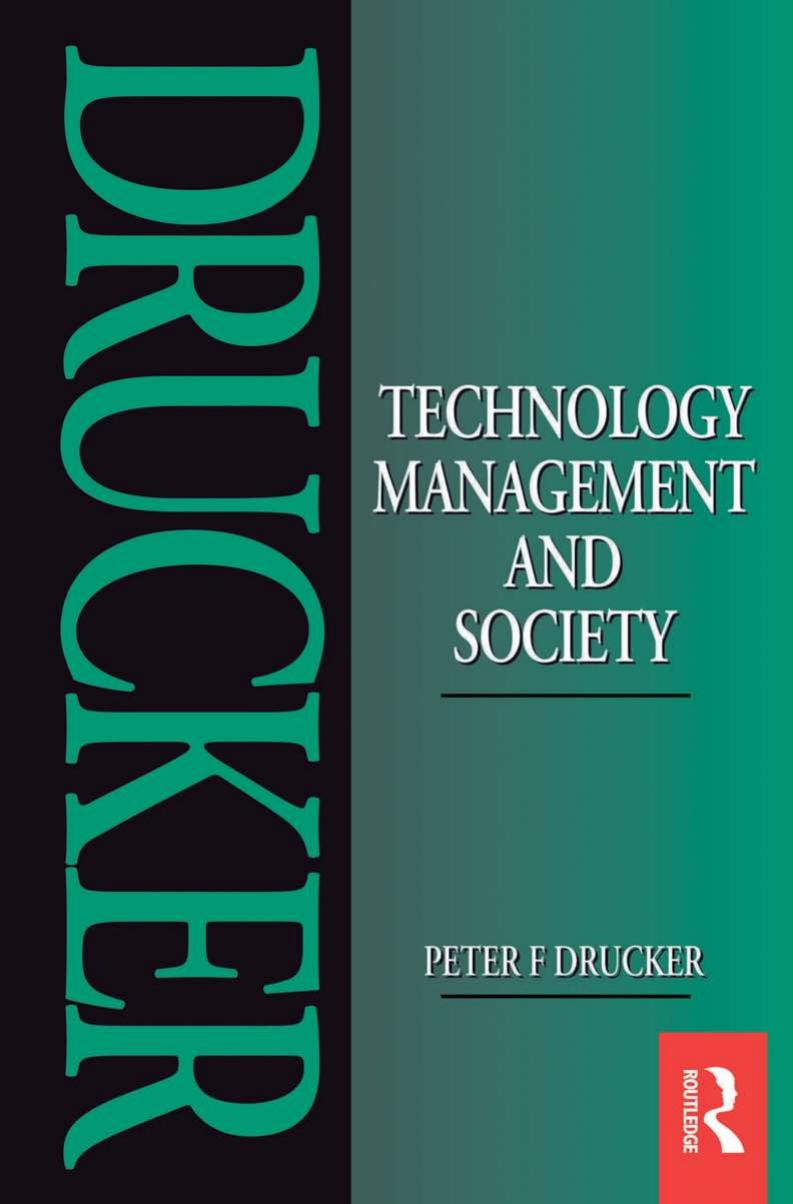Technology, Management and Society by Peter Drucker

Author:Peter Drucker
Language: eng
Format: mobi, epub, pdf
Publisher: Taylor and Francis
Published: 2012-09-09T14:00:00+00:00
7. The First Technological Revolution and Its Lessons
Presidential address to the Society for the History of Technology, 29 December 1965; first published in Technology and Culture, Spring 1966.
AWARE that we are living in the midst of a technological revolution, we are becoming increasingly concerned with its meaning for the individual and its impact on freedom, on society, and on our political institutions. Side by side with messianic promises of utopia to be ushered in by technology, there are the most dire warnings of man’s enslavement by technology, his alienation from himself and from society, and the destruction of all human and political values.
Tremendous though today’s technological explosion is, it is hardly greater than the first great revolution technology wrought in human life seven thousand years ago when the first great civilization of man, the irrigation civilization, established itself. First in Mesopotamia, and then in Egypt and in the Indus Valley, and finally in China, there appeared a new society and a new polity: the irrigation city, which then rapidly became the irrigation empire. No other change in man’s way of life and in his making a living, not even the changes under way today, so completely revolutionized human society and community. In fact, the irrigation civilizations were the beginning of history, if only because they brought writing.
The age of the irrigation civilization was pre-eminently an age of technological innovation. Not until a historical yesterday, the eighteenth century, did technological innovations emerge which were comparable in their scope and impact to those early changes in technology, tools, and processes. Indeed, the technology of man remained essentially unchanged until the eighteenth century insofar as its impact on human life and human society is concerned.
But the irrigation civilizations were not only one of the great ages of technology. They represent also mankind’s greatest and most productive age of social and political innovation. The historian of ideas is prone to go back to ancient Greece, to the Old Testament prophets, or to the China of the early dynasties for the sources of the beliefs that still move men to action. But our fundamental social and political institutions antedate political philosophy by several thousand years. They all were conceived and established in the early dawn of the irrigation civilizations. Any one interested in social and governmental institutions and in social and political processes will increasingly have to go back to those early irrigation cities. And, thanks to the work of archaeologists and linguists during the last fifty years, we increasingly have the information, we increasingly know what the irrigation civilizations looked like, we increasingly can go back to them for our understanding both of antiquity and of modern society. For essentially our present-day social and political institutions, practically without exception, were then created and established. Here are a few examples.
(1) The irrigation city first established government as a distinct and permanent institution. It established an impersonal government with a clear hierarchical structure in which very soon there arose a genuine bureaucracy – which is, of course, what enabled the irrigation cities to become irrigation empires.
Download
Technology, Management and Society by Peter Drucker.epub
Technology, Management and Society by Peter Drucker.pdf
This site does not store any files on its server. We only index and link to content provided by other sites. Please contact the content providers to delete copyright contents if any and email us, we'll remove relevant links or contents immediately.
Hit Refresh by Satya Nadella(9136)
The Compound Effect by Darren Hardy(8968)
Change Your Questions, Change Your Life by Marilee Adams(7783)
Nudge - Improving Decisions about Health, Wealth, and Happiness by Thaler Sunstein(7707)
The Black Swan by Nassim Nicholas Taleb(7129)
Deep Work by Cal Newport(7085)
Rich Dad Poor Dad by Robert T. Kiyosaki(6633)
Daring Greatly by Brene Brown(6514)
Principles: Life and Work by Ray Dalio(6449)
Playing to Win_ How Strategy Really Works by A.G. Lafley & Roger L. Martin(6308)
Man-made Catastrophes and Risk Information Concealment by Dmitry Chernov & Didier Sornette(6019)
Big Magic: Creative Living Beyond Fear by Elizabeth Gilbert(5773)
Digital Minimalism by Cal Newport;(5765)
The Myth of the Strong Leader by Archie Brown(5508)
The Slight Edge by Jeff Olson(5418)
Discipline Equals Freedom by Jocko Willink(5390)
The Motivation Myth by Jeff Haden(5212)
The Laws of Human Nature by Robert Greene(5208)
Stone's Rules by Roger Stone(5088)
